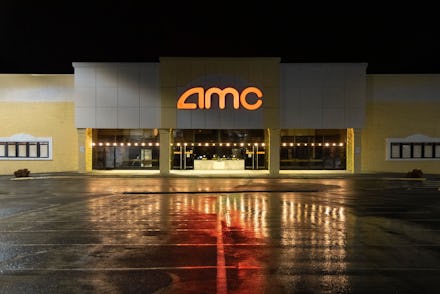Is this the end of the movie theater as we know it?

The world’s largest movie theater chain is in serious trouble. According to a Wall Street analyst who spoke with the Hollywood Reporter, AMC Theatres will likely file for chapter 11 bankruptcy by summer’s end. MKM Partners analyst Eric Handler downgraded their stock to “sell,” projecting that AMC’s monthly cash burn would only keep the company liquid through June or July.
In his report, Handler details concerns about AMC deciding to not pay April rent for its theaters, along with furloughing all 600 corporate employees in March. “We think bankruptcy is a distinct possibility, and at a minimum, the company will require a highly-dilutive financing,” he writes. Handler is operating under the assumption that AMC won’t be able to re-open until August at the earliest, with almost every major studio clearing its summer release schedule through July.
AMC, however, has reportedly been pursuing catalog titles from studios to re-open as early as May. This indicates that it may be following China’s footsteps, which is testing the market with re-releases of old favorites like The Avengers, Avatar, and Christopher Nolan blockbusters. My local AMC already has classic movie nights on Wednesdays, rolling out themed programming each month, so this could easily be the blueprint before studios feel comfortable shipping out major releases with different parts of the country in staggered recovery from quarantine.
Although coronavirus has sent shockwaves through the art houses and major theater chains, a chapter 11 filing wouldn’t necessarily be a fatal blow for AMC. Going the way of numerous major retailers in recent years, like Sears, Claires, Pier 1 Imports, and several major airlines in the early 2000s. It would likely mean a reorganization of AMC’s assets and debts while still operating as a “critical vendor” that could remain open despite its nearly $5 billion in debt.
That said, if chapter 11 turns into chapter 7 or further liquidation, it leaves a major unknown for the future of cinema in America. As film critic Simon Abrams has pointed out, AMC’s shuttering would spell doom for mainstream Asian and Indian films to have a theatrical home in the states, since they’re one of the only major chains to consistently carry international hits. Other major chains, such as Cinemark, would remain in its wake, and open the door for new avenues of moviegoing.
But with the Justice Department moving to terminate the Paramount Decrees, it presents an alarming opportunity for Disney, Netflix, or any other large studio that manages to survive the pandemic to seize the theatrical marketplace and push us further toward cultural monopoly. Netflix’s purchase of New York’s legendary Paris Theater last year signalled their interest in the theatrical space, if for no other reason legitimizing their Oscar-contenders as worthy for awards consideration by streaming skeptics.
The effects of this are unclear, like with everything else that could stand to change in the coming months. Perhaps studio-owned theaters would open wider fissures between mainstream and independent theaters to coexist. Or, in the worst case scenario, simply relegate large, restrictive, studio-owned movie houses to be the only competition left standing. With every studio facing steep losses in the short-term, that’s still a distant reality, but not one that’s inconceivable.